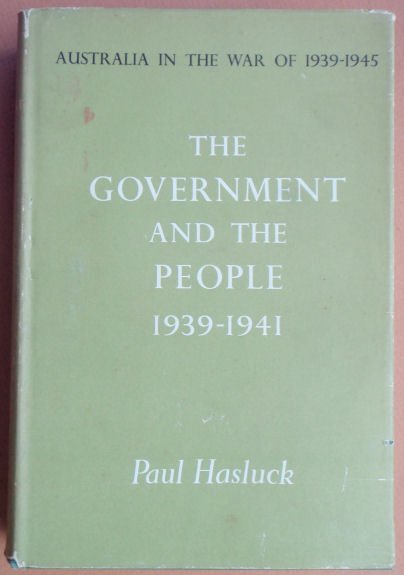Paul Hasluck, The Government and the People 1939-1941 (1952)
Before Paul Hasluck became a Minister in the Menzies Government, he was a public servant personally recruited to the Department of External Affairs on the advice of John Curtin. More remarkable still, was that Hasluck worked directly under H.V. Evatt to formulate the extension of Commonwealth powers that would ultimately lead to the failed 1944 referendum.
While at face value, it may seem quite biased to have a Liberal author the official history of Australia’s home front during World War Two, this context makes it clear that Hasluck had access to insiders’ perspectives from both sides of the political fence. Combined with an academic background as a history lecturer at the University of Western Australia, Hasluck was thus the perfect man for the job.
Published in 1952, volume 1 of Hasluck’s landmark The Government and the People focuses almost exclusively on the period of Menzies’s first prime ministership, and contains numerous insights into how different that early stage of the war was from the years that proceeded it. Above all, Hasluck’s tale reveals how unprepared the Australian people were to face another global conflict. Demoralised by the years of the Great Depression and the failure of appeasement, a large section of the Australian public were reluctant to face up to the realities of war and the immense sacrifices that would ultimately be necessary for victory. This made Menzies’s job as wartime prime minister immensely challenging, as even the most basic wartime sacrifices, such as early attempts to limit fuel consumption, faced fierce opposition.
The book is also fascinating as a pre-Cold War history of Menzies’s dealings with the Communist Party of Australia, which does much to explain why he later sought to ban it. It is often forgotten that during the early years of the war, the Soviet Union acted as a pseudo-Axis power, not only participating in the invasion of Poland but also launching its own invasion of Finland.
In Australia, the CPA vigorously supported these Soviet policies, attacking Australia as an imperialist power whose war effort it wanted to directly undermine. In the period after Poland’s capitulation, the CPA were one of the central advocates of the so-called phoney war, the idea that Australia did not need to mobilise as the British had merely been saving face when they declared war over Poland, and now that the territory was conquered the conflict would peter out. The widespread acceptance of such an idea was a major obstacle for Menzies in his attempt to galvanise the nation for what he accurately predicted would be a long struggle.
Once the concept of the phoney war itself proved to be a mirage, the communists instead turned their attention to encouraging strikes in a bid to undermine the so called imperialists. Hasluck argues that ‘during the war, industrial stoppages were regarded by the Communists as being of prime importance as a political weapon rather than as an immediate objective in themselves’
There were also serious allegations that the Communists were trying to infiltrate our military. In January 1940 a memorandum was submitted to the War Cabinet which warned that ‘the well-known method of the Communists was to plant “cells ” in units—one to spread propaganda and to lead agitation, and another to collect information and to learn as much as possible of military technique, especially the handling of arms. It was also known that the party had a special section whose principal task was to carry out this secret work in the armed forces and that recently branches had been instructed that the party’s “unknown members” must join the militia, although the party’s public fight against conscription was to continue. One definite instance at Ingleburn was quoted of a proposal that party organisers should work on the discontent of the troops over alleged profiteering in canteens and organise them for mass demonstrations against the Federal Government’.
The Naval Board reported its own ‘clear indications that Communist agitation and activities are growing amongst naval personnel’, and all three services pressed the government to use security regulations to declare the Communist Party an illegal organisation. The Cabinet initially resisted this proposal, preferring to err on the side of civil liberties, before further investigations led to a ban finally being imposed on 15 June 1940.
Such a ban did not stop the Communists from putting up their own ‘independent’ candidates at the 1940 election, nor continuing with their disruptive propaganda (albeit at a more limited scale). Indeed , even when Hitler finally invaded Russia in Operation Barbarossa, Hasluck reports that the Australian communists were so used to parroting Soviet talking points that they were confused as to how to react to the whole situation. Far from immediately embracing Mother Russia’s new allies, they continued to insist that the changed circumstances did not alter the ‘class character of the ruling monopolists in our own country or any other’.
Sign up to our newsletter
Sign up for our monthly newsletter to hear the latest news and receive information about upcoming events.


